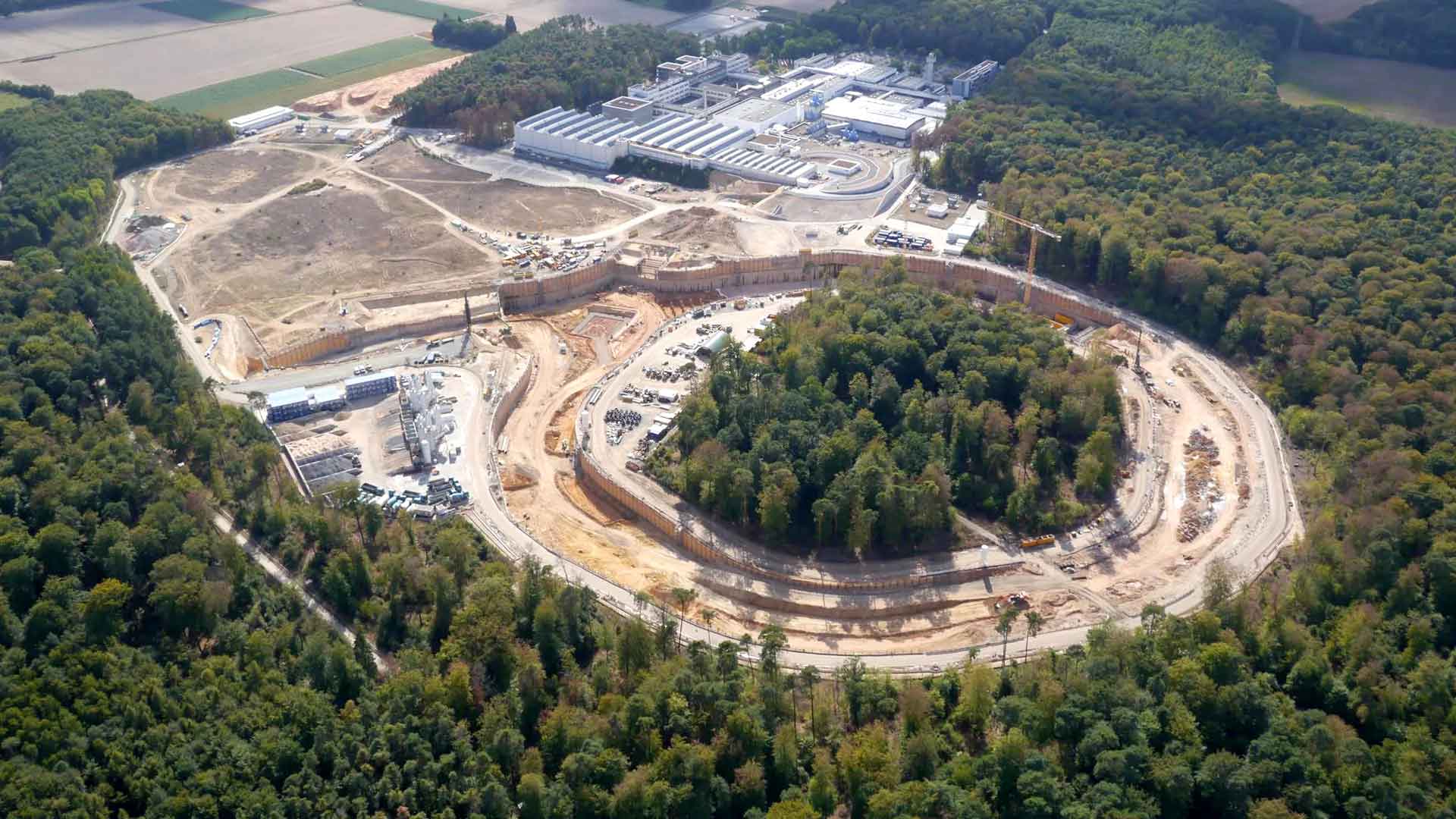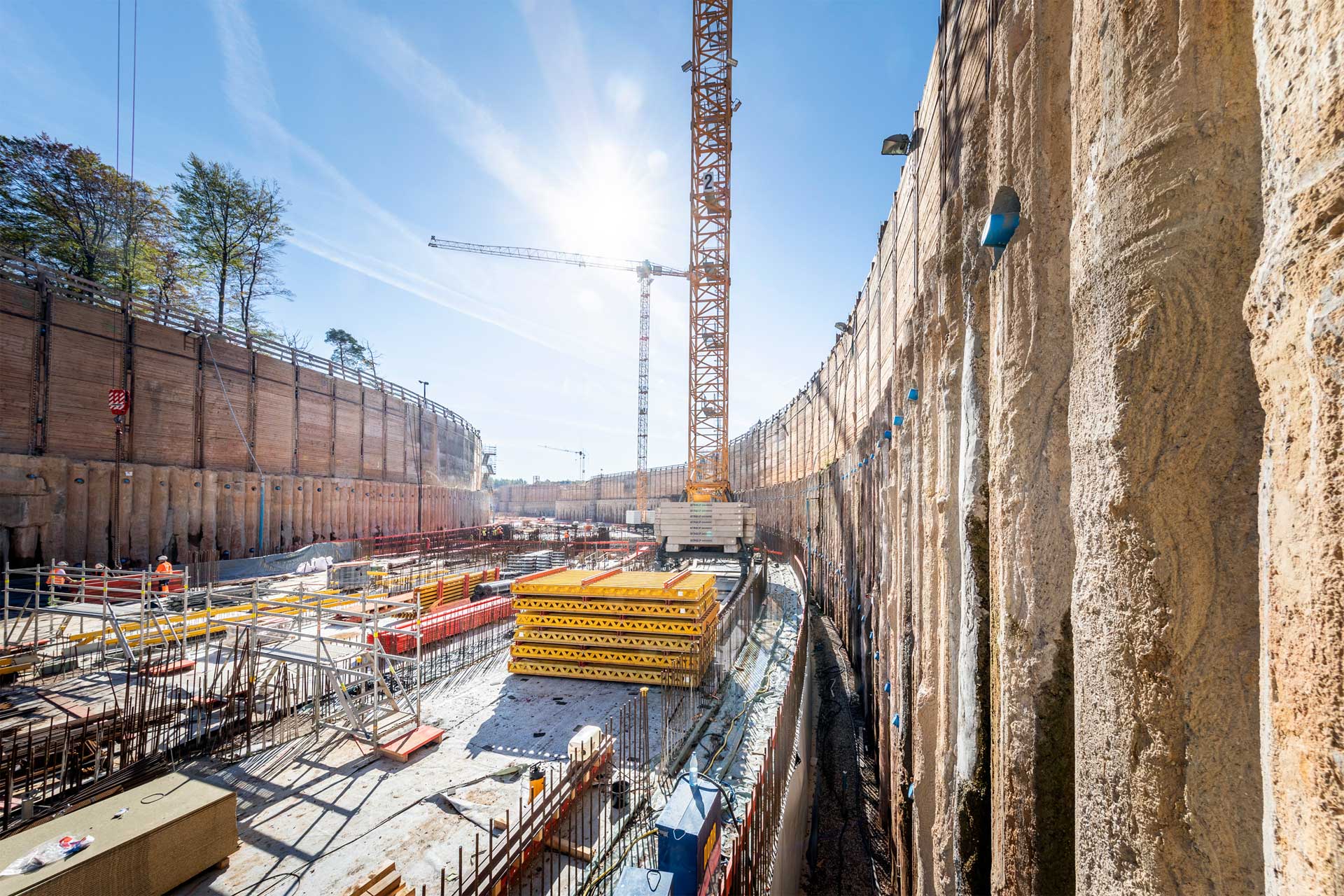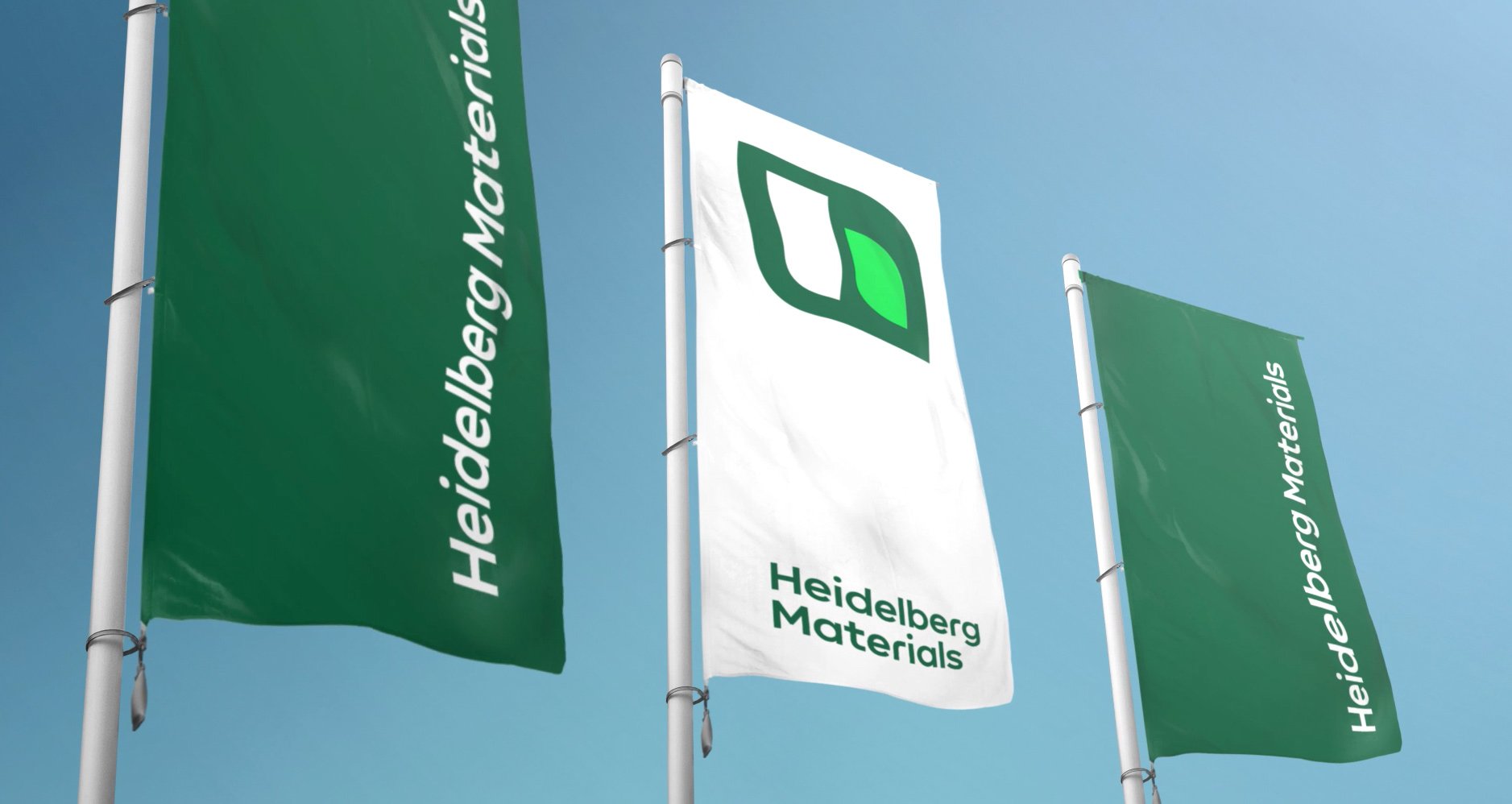Particle accelerator facility FAIR
Accelerated particles behind thick concrete walls
The new particle accelerator "FAIR" in Darmstadt will help unveil the secrets of the universe. Its ions and antiprotons pick up so much speed that they are almost as fast as light.
You have to think big to stay on the track with the smallest particles: In the future, ions and antiprotons with a diameter of around one ten millionth of a millimeter will pick up extremely high speeds at the new FAIR particle accelerator center in Darmstadt. The electrically charged particles there are expected to reach almost the speed of light of about 299,000 kilometers per second. Then they collide with a resistor, a foil or biological cell samples. The accelerated ions and antiprotons will be used for experiments in various fields of research, from particle, nuclear and atomic physics to plasma physics, materials research, biophysics and tumor therapy.
The international particle accelerator centre FAIR in Darmstadt will be one of the world's largest research facilities for basic physics research and will provide new insights into the structure of matter and the development of the universe from the Big Bang to the present day. Over the next few years, one of the world's most complex accelerator facilities will be built on 20 hectares at the GSI Helmholtz Centre for Heavy Ion Research, whose existing accelerator facility will be used as a preliminary stage for FAIR. A total of 20 new buildings and a 1,100-metre long ring tunnel will be constructed. "We are building the tunnel in an open construction approach," explains Sven Sachs, Manager FAIR Site & Buildings. "One of the reasons is that the radius of curvature of the tunnel is too small in places for tunnelling machines. The tunnel will be built in sections of around 200 meters each, at the deepest point the tunnel floor is around 17 meters below the surface and has up to six meter thick concrete walls," explains Sachs.
The FAIR Accelerator Centre
The international particle accelerator centre FAIR (Facility for Antiproton and Ion Research) is a facility for fundamental physical research. It is being built in Darmstadt at the GSI Helmholtz Centre for Heavy Ion Research. It is supported by Germany as well as European and non-European partner countries. FAIR is intended to provide new insights into the structure of matter and the development of the universe.
A total of 1,350 bored piles of up to 60 meters in length and 1.20 meters in diameter stabilise the subsoil so that the heavy facility will later settle less and, above all, more equally. "In order to be able to estimate the settlement, geotechnical engineers carried out extensive soil investigations in advance. The soil samples taken showed that the subsoil consists mainly of sands, silt and clay. Such soils are compressible, i.e. they change their density under great pressure," explains Sven Sachs. "Our foundation concept therefore provides for the bored piles to support the heavy buildings by means of a combined pile and slab foundation; the less heavy buildings are flat-founded," says the engineer. This will largely compensate the differences in settlement between the buildings and where settlement in the ground is to be expected due to massive earth fills.
The dimensioning of the components, in particular the thickness of the ceilings and walls, must also meet the requirements of radiation protection. A total of up to 600,000 cubic meters of concrete will be used for the new accelerator centre - enough to build eight soccer stadiums. For the Northern section of the facility, Heidelberg Materials is supplying around 40,000 tonnes of CEM III/B 32.5 N-LH/SR (na) from its Mainz plant in a joint venture with Dyckerhoff GmbH. The special feature: "The blast furnace cement has a lower heat generation during the setting process of the concrete. Less heat is released and the strength formation of the concretes with these cements is slower than with CEM-I cements," explains Dr. Klaus Felsch, Project Manager Infrastructure at Heidelberg Materials in Germany. "In mass concretes, such as those used for the thick floor slabs and walls at FAIR, this significantly reduces stresses due to temperature gradients between the core and surface and limits crack formation. This makes the concretes more durable," says Felsch. In addition, 65,000 tonnes of steel will be used, which corresponds to nine Eiffel Towers.
Radiation protection is written BIG
You need mass to stop the beam: The main tunnel is almost 17 metres underground and is divided into a supply tunnel, a technology tunnel and a radiation tunnel. In between are concrete shielding packages up to six metres thick. A normal concrete with radiation protection requirements is used here. The surrounding soil is also subject to special requirements, such as special compression or composition. To prevent radiation from escaping, all house entrances and passages are meandering.
"The complexity and diversity of the technical and physical installations as well as radiation protection make special demands on the planning and implementation of the overall project," explains Dr. Harald Hagelskamp, external Site Manager at FAIR. "Close coordination between building construction and civil engineering, technical building equipment and science is therefore particularly important. After all, around 3,000 scientists from all over the world are to conduct cutting-edge research with FAIR in the future. "With FAIR, we are giving scientists an instrument that offers them unrivalled experimental possibilities," says Hagelskamp. "Perhaps they will even succeed in bringing the Nobel Prize to Darmstadt."
Location
Darmstadt (Germany)
Particle accelerator facility FAIR in Darmstadt, Germany.
ion42/GSI/FAIR

Particle accelerator facility FAIR in Darmstadt, Germany.
Heidelberg Materials

Photomontage of the future FAIR accelerator facility, Germany.
ion42/GSI/FAIR

Particle accelerator facility FAIR in Darmstadt, Germany.
ion42/GSI/FAIR

Particle accelerator facility FAIR in Darmstadt, Germany.
Heidelberg Materials

Photomontage of the future FAIR accelerator facility, Germany.
ion42/GSI/FAIR
